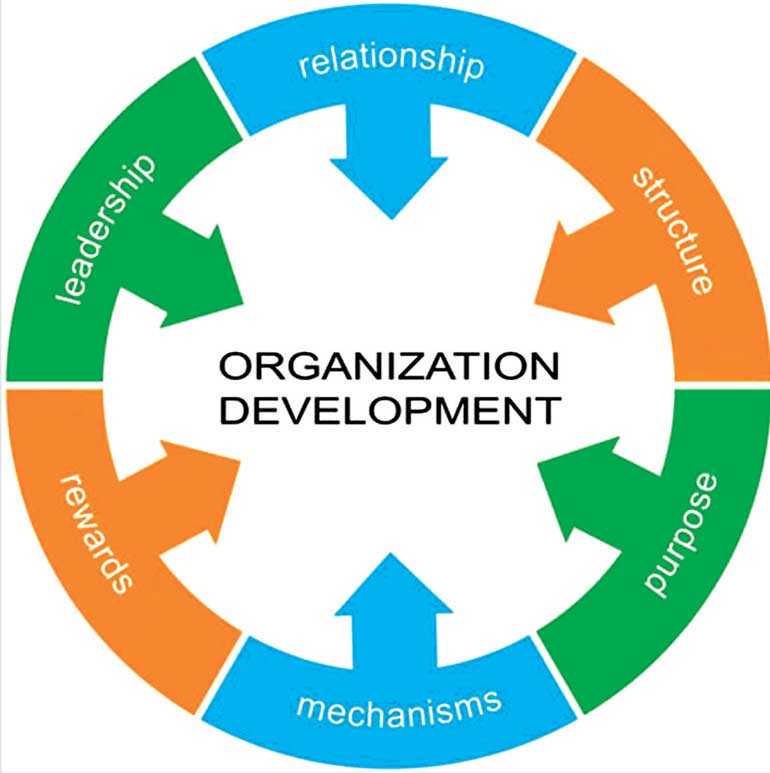Thursday Feb 19, 2026
Thursday Feb 19, 2026
Tuesday, 24 September 2019 00:37 - - {{hitsCtrl.values.hits}}

Senior executive leadership realises the importance of being agile, adaptive, and willing to change as needed. A traditional theory and practice employed in the business community for decades has been the science of Organisation Development
In a rapidly changing global environment, organisations are exposed to complex issues affecting a wide range of strategic functions. Regulatory environment, competition, employee attitudes, and resistance and reactions to change are some of the challenges organisations deal with on a daily basis.
Globalisation and increased migration patterns in the world population are adding to the stress businesses face, thus increasing the demand for strategic solutions capable of increasing company effectiveness. Today, more than ever before, organisations understand the urgent need of responding to the changing global environment.
Senior executive leadership realises the importance of being agile, adaptive, and willing to change as needed. A traditional theory and practice employed in the business community for decades has been the science of Organisation Development (OD). 
However, in most local corporations, especially prevalent in the State sector in times past, and the real results of OD have been re-evaluated more than once in the world, it has been acknowledged that, Sri Lankan organisations have lost its roots of dealing with total organisation change, stuck in the process of personnel management centric paper pushing or stuck in the grid of HR Management, with few exceptions. Whole Systems Transformation (WST) has emerged to again bring enterprise-wide change as a central focus towards Organisational Transformation.
In my eyes, OD is the ‘job’ and WST is the DNA of the ‘man’ for the mission. Why Organisational Transformation? This approach of a complete systems transformation is best practices and theories, developed and integrated into a single approach that enables organisations to accomplish faster, cost effective, and sustainable positive change.
It has to be duly noted that Whole Systems Transformation has been based on the profession of the Organisation Development, but addresses the challenge of change with a major philosophical difference. While WST does take into consideration the views expressed by OD, it addresses the major shortcoming of OD head on.
It has to be duly noted that Whole Systems Transformation has been based on the profession of the Organisation Development, but addresses the challenge of change with a major philosophical difference
Practicing OD in a business is the big step the leadership should initiate and give it its due place in the organisational structure – however, getting the incumbent to transform the business needs Whole Systems Transformation capability and the ability (whole being the key word) facilitates change that is all-inclusive, is comprehensive in nature, and addresses the issues of the entire organisation as a whole.
OD on the other hand tends to be tool and technique based while focused on separate aspects of the organisation. In most cases it simply lacks the ability to transform the organisation in its core – which is why most change initiatives in organisations fail. What can a seasoned OD expert with Whole Systems Transformation can do for you? The stated ability calls for all parts of the system to be modified.
Furthermore, WST transforms the organisation as a ‘unified whole’, meaning the organisation undergoing the change shifts from one configuration to another. What does this mean in very simple terms one might ask? The conventional view of organisational development suggests that, in order for an organisation to undergo a successful change, one has to understand the systems making up the organisation, and change them according to a predetermined plan.
An incumbent with WST in his DNA on the other hand, brings to the job even more; WST realises the need for change, and suggests an approach that reinvents the organisation itself. Whole Systems Transformation capability is not just a transformation of all systems in the organisation; it is the reinvention of an entirely new system.
Furthermore, once the initial steps of the change have been made, the system allows for the organisation to engage the critical mass as it explores new possibilities, and begins achieving its full potential. Steps in the process.
I will try my best to let you realise its importance to compete in the corporate world – this article will further elaborate on the steps needed in order to implement a successful change in an organisation.
In the scanning process, an overview is completed of the current state. At the planning stage, the organisation involves top executives and professionals to design the action plan. During the acting stage, planned steps are integrated into the design of the new system. At the reacting stage, the process is repeated in order to evaluate what has happened.
During the Action Research process it is critical for top leadership to be involved, since they are the ones who have the power to influence, and become role models for what is expected of people from the company.
Simply invest in the OD/HR Head in a business for the above capability and add WST is a paradigm change, once this is in his DNA is where a ‘breakthrough’ can be achieved. After WST, employees change the ways in which they perceive, manage, think, and behave… it is always not that change approach – but the absence in WST capability in the incumbent… that needs the attention of the Leadership – Now or Never.
(The writer, founding thought leader of IIHRM influenced 45 nationalities, in 27 countries spanning four continents was the former Group Senior VP HR and Facilities Management at Dialog Axiata PLC; Chief Organisational Development Director of ACC; OD Board Advisor to Al Khodary PLC; Group HRM at Carson Cumberbatch PLC; Manager HRD SriLankan Airlines; Group Director HR and New Business Dev Fairway Holdings; Head HR LION Brewery PLC; AGM HR, Retail Broking and Branch Development Allied Stock Brokers; Country Trainer, HR Manager and Head Crisis Team at DHL Middle East, and Sales Representative at Unilever Ceylon.)